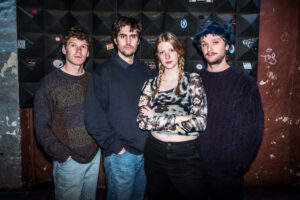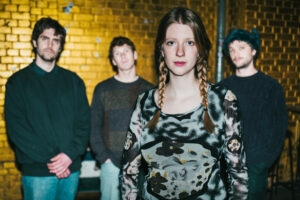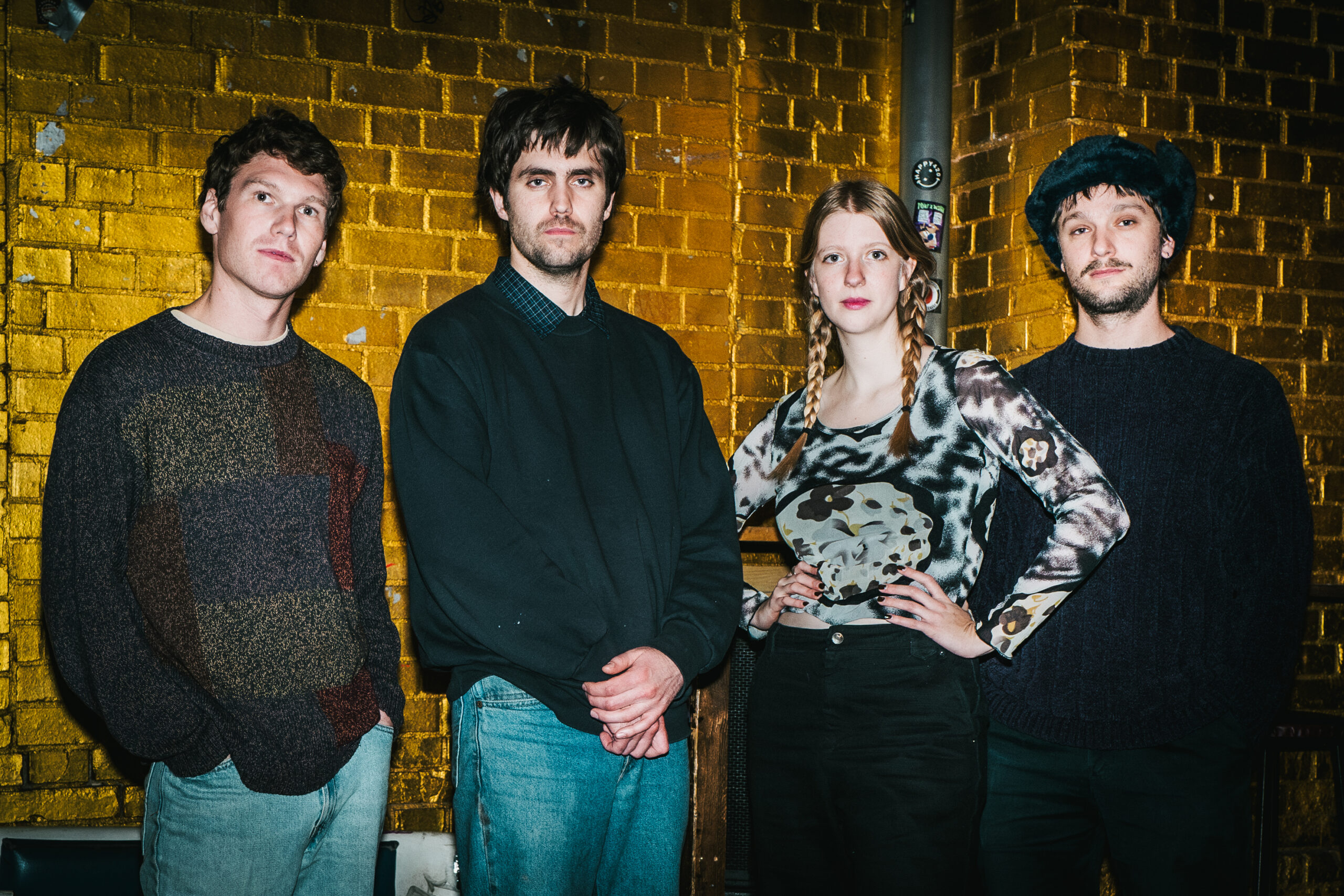Foto-© Sebastian Madej
Slow Pulp ist eine Band, die von außen betrachtet den Inbegriff von Americana verkörpert. Entstanden ist sie aus der langjährigen Freundschaft zwischen Gitarrist Henry Stoehr und Schlagzeuger Teddy Mathews, zu denen sich später Bassist Alex Leeds gesellte. Nachdem die drei bereits zwei EPs veröffentlicht hatten, wurde das Quartett schließlich durch die Sängerin und Gitarristin Emily Massey vervollständigt. Gemeinsam veröffentlichten sie wiederum zwei EPs sowie ihr Debütalbum Moveys (2020). Schließlich unterschrieben sie einen Plattenvertrag bei Anti-, wo im September 2023 ihr zweites Album Yard erschien.
Wir konnten mit Massey auf dem Weg zu ihrem Konzert in Berlin im Dezember sprechen. Im Interview erfahren wir, welche Songs sie auf der Tour überrascht haben, warum sie sich in eine Hütte zurückgezogen hat, um Yard zu schreiben, was Ballett damit zu tun hat, wie sie von der Backgroundsängerin zur Frontfrau wurde und wie ihr zweites Album ihr Selbstvertrauen in dieser Rolle gegeben hat.
 You are currently touring with your second album Yard, which was released a little over two months ago. How does it feel playing it live?
You are currently touring with your second album Yard, which was released a little over two months ago. How does it feel playing it live?
It has been a really fun time to tour the record so far. When we put out our first record, Moveys, we put it out during the pandemic, so we weren’t able to tour it right away. This is a new experience to be able to play a record and have people engage with it in such a direct way so quickly. We really didn’t know how it was going to go and it definitely exceeded our expectations.
Let’s talk about writing Yard. You chose to isolate yourself in a cabin and I find it remarkable that at a time when all people wanted to do was connect, you chose to disconnect, go into the cabin and write.
It was kind of an accident. During the pandemic, I was working as a ballet teacher for little kids and we were back in person, but we were still masking a lot and trying to quarantine if you were exposed to Covid. I had an exposure. The protocol with the school was that I had to not teach for a week. So I kind of went on a last minute whim to a family friend’s house in northern Wisconsin. I just tried to write up there for the first time and be alone like that for the first time. And I really loved it. Quarantine for me was being with my family. I spent a lot of time with very few people. I think I needed that total isolation to properly heal from that time. It opened up a lot of writing opportunities and invulnerability for me. It felt like the right space to start making the record and to start generating ideas. But once we had some of the songs written in a very demo, very sparse space, we were able to record things together and flesh out different parts together, which we didn’t get to do on the first album. Even though it had a lot of aspects of chosen isolation, it was still very communal.
So, you come back with ideas and demos and then you put it in the bigger perspective together? Or did it go bit by bit?
It was bit by bit and song by song. The first round of recordings we did were still demos, but everybody had some kind of initial ideas for their respective instruments. Henry [Stoehr], who plays guitar in Slow Pulp, also does the production and mixing of our records. So once they were in that space, he took the songs and was able to add the magic and a lot of the elements that make the songs what they are and what you hear now.

You came from a very specific time and place. Isolating yourself in the middle of the pandemic in the woods is a pretty unprecedented place to be in. Can you still relate back to those feelings now? How does it feel to live with them now in such a different reality?
I can go back to the emotional headspace I was in when I was writing. The lyrics for these songs touch on how the subject matter makes me feel. Sometimes when we play the songs live, I can get really emotional about it. But I try to put on a smile and make it look like I’m having fun. And I am having fun, but some of the songs are dealing with very difficult subjects or things that bring up a lot of emotions in me. But I also think it’s great because people get involved and have their own relationship with the songs. Maybe that’s not even what it’s about for me, but I think it’s so special that people are able to take the music and project their own life experiences onto it. I think there’s aspects of all the songs that people can relate to.
So you don’t have the urge to tell them what you meant when you made them? Is it easy for you to let them go and live another life in other people’s heads?
It’s probably different for different artists, but for me the broader scope of what a song might mean or an emotion that it hits can be pretty malleable. There are so many songs that other people have written that I love that I have connected to different experiences in my own life that become some of my favorite songs. If people do that with our music, I think that’s what it’s for. It’s for them to take it and let it be their own thing.

Do you read what is written about your work?
I think it is 50:50. Sometimes I like to detach myself from it once it comes out or once an interview is done, I like to just leave it at that. But I’m always interested to see what people’s take is. It’s interesting to see what people think outside of my own biased opinion about everything. But usually I tend to be a little bit more on the detached end of things.
On tour you get a more immediate kind of feedback. Have there been things on this tour that have surprised you?
I was a little nervous about playing the slower, quieter, more intimate songs like Yard, Broadview or Fishes. I thought they would kill some kind of energy or not be as exciting for the audience as some of the other rock-heavy songs. But they have become some of our favorite songs to play live. People seem to have a deep connection to them. It’s cool to see that happen.
Do your favorite songs to play live differ from your favorite songs on record?
One of my favorite songs on the album is Yard. I didn’t think it would be a favorite song to play live, but I guess it kind of is. I also really like to play Slugs. That was another one of my favorites off the record. I think they actually end up lining up and matching up. Cramps is also really fun to play live. It’s our most energetic song. But they all have their own things that I like about them for sure.
How do you feel Yard is different from Moveys now that you are playing the songs from your first and second album together?
As we were making it, we were able to take a lot of things that we learned on the first record and apply them to this record. I think it’s a little more developed in that sense, and it feels a little more open, a little more emotionally vulnerable. We tried our best and hope for the best. You hope that every record you make is a little bit better than the last one, at least in the process. I really feel like that was the case with this one.
I would like to learn more about your dynamics as a band. I read in another interview that you said that you took over the band after you joined for rhythm guitar and backing vocals and I found it quite funny. How did that happen? How was the creative dynamic then and how is it now? 
It was a bit of a joke when I said that, it was a slower process of becoming the front person. My three bandmates, Henry, Teddy [Mathews] and Alex [Leeds], had a band before I joined, and they were looking for someone to fill out the live show that they had developed. I was initially brought in to play rhythm guitar and do some backing vocals, and then I slowly started writing some songs and then I started singing some of the songs. I just started writing more and taking on the role of the front person. I feel like it was a pretty natural and pretty smooth transition into that. It wasn’t an immediate change, it happened over time. My bandmates believed in me a lot more than I believed in myself at that point. So another difference on this record is that I finally felt like I was allowed to own it or define myself as the front person. But I think they kind of felt that before I did.
As you said, Yard is more vulnerable than your first album, it deals with real people from your personal life. Do you talk to your bandmates about it?
When I start writing a song, I don’t consciously decide what it’s going to be about. It kind of comes out. When I write a melody, I usually sing pretty random words. But some of the lines that come out of that initial run-through of a first idea for a melody are usually what I end up building the song around. On this record I just feel so much trust from my bandmates. They don’t fry too much about what the songs are about. They let me talk to them about it if I want to, which I really appreciate. But I’m always very open to discussion if they want to know what it is. Sometimes I think they can just guess what it is because we’re very close. But it really just comes from a place of trust and comfort.
Do you write on tour? Do you test out new material?
We haven’t done that yet. I think that would be a cool thing to try and develop. Before we play a song live, we really want to make sure that the arrangement feels right. We spend a lot of time trying to figure out what the live iteration of the song is, but I think it would be cool to have something that is not fully fleshed out and just test it out on the road.
Thank you for the interview!










